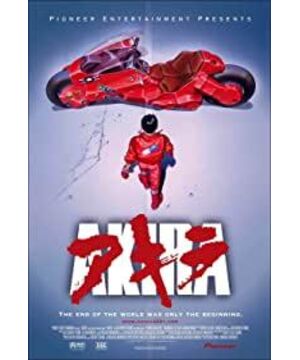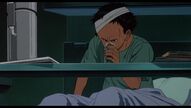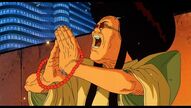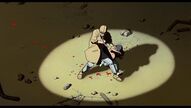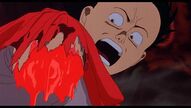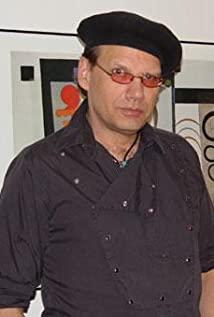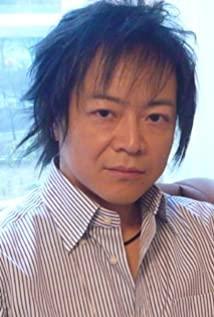After reading it two months ago, I wanted to give it 3 to 4 points. I felt that no matter how creative the subject matter and details were, or how innovative and impactful the visual presentation was, the whole story structure was still naive and rough, and I didn't do it right. However, I didn't realize until I read the article commemorating Max Weber recently that the film is about Weber's ultimate question: How can human freedom be realized in a highly bureaucratic capitalist society? Then it is normal to not be able to give an answer. Where the sages stopped, the descendants have not yet made a breakthrough.
Only 31 years after the nuclear explosion, metropolises, high-rise buildings and urbanites can quickly reproduce and regenerate. As the camera moves forward, the skyscrapers that can't be seen at a glance are stacked, each divided into countless windows and lights, this huge and dense become a powerful oppression. The majestic Qiongyu Mansion and the pyramid-shaped military building are all visual representations of the power structure. The office workers who move in the middle without even showing their faces constitute the backbone of the society. Several floors high.
Overlooking the sea of lights, the colonel said: "The enthusiasm for construction has faded, and the joy of revival has faded from memory. Now this is a garbage dump full of idiots who are carried away by desire." Yes, it is desire, ignited by capitalism, The desire to liberate and even magnify, pushes people to climb up from the bottom, and becomes the power source and stabilizer of the capitalist system. Compared to the time of Weber's death, the capitalist system is now immeasurably perfect, like an "overripe fruit," overwhelming all other options and destabilizing forces. In the huge, strict and unshakable bureaucracy, countless people are suppressed into various windows and channels, similar to each other, can be replaced at any time, and become consumables in the form of social organization. This is a possibility for people A ruthless devaluation of sexuality and worth.
Where will the highly developed capitalism take the destiny of human beings, and how can human freedom be realized?
0. The crowd of people walking through the streets of Shinjuku at the fastest pace in the world, the sardines in the subway, the indifferent Tokyo office workers in suits and ties and trench coats - the iconic capitalist Japan, which is not exposed in the film at all, because it is not Self-evident reality, but also because this is the background that has not changed.
The actors in the film are:
1. Bewitching by xie teaching, it is not even a trend of thought, it is just the desperate sustenance of the marginalized and the play on the street, which has almost no effect. In the end, this is a mechanical, conditioned response: if the disenchantment and rationalized world does not allow for human freedom, then let the world re-enchantment and bring forth “false gods” one by one. . Of course, the reality has been verified again and again, and the simplest answer is often a trap.
2. Under the strong bureaucracy, the so-called resistance organizations and chaos are actually tools for internal factional struggle. Even if they succeed, it is only a change in the leadership of the system, and it is impossible to shake the system.
3. Science represented by Dr. Onishi. The progress of human civilization so far has largely relied on the progress of science, but it is undeniable that scientific development is endless and value-neutral. Only under the discipline of scientific and technological ethics can it become a force that can be controlled. Therefore, Dr. Onishi's actions can be directly interpreted with the original text of Weber's "Academic Career":
All the natural sciences give us answers to the question: Suppose we want to control life technologically, how do we do it? Whether we should technically control our lives, or whether we should have the desire to do so, or whether it makes sense to do so, is not a question for science, or it is just a bias for its own purposes.
Therefore, science is also the source of fear and disaster. Think of Frankenstein, nuclear bombs, genetic modification... The scientists represented by Dr. Onishi in the film dissect God, but cannot understand God; they call out the supreme power , but not light, but a shadow covering the city.
4 Colonel and 5 Jintian represent the revolutionary charisma written by Weber. They are original actors with valuable goals and personal responsibility. They dare to break through the bureaucracy. They have gained a following of people. The difference between the two is that one is a political leader in the public sphere and the other is a leader in a private group.
4. Colonel
4.1 Ethically rationalized political leaders
Compared with the male protagonist Jin Tian, who can only get one-sided information and is driven by very direct emotions, the colonel is the main line of the plot. He appears in almost all scenes, with complete and full clues and images; he understands the past, present, and future, and is in high-level positions, in charge of laboratories, and battlefields; the film not only allows him to confess to high-level cadres and Dr. Onishi, even before usurping power It also directly revealed the psychological activities.
The top cadres are all professional politicians, and the top cadre meeting is the performance of bureaucratic rule and the routine of political order. , in other words, an image with personality, creative action, and a sense of responsibility.
4.2 Japanese traditional bushido
In a way, all the characters are orphans or cut off from their families of origin, losing their connection to history. And the colonel not only provided fatherly protection, but also became a representative of traditional Japanese values. One of the top cadres said that "the key lies in negotiation skills and prior dredging", but the colonel bluntly disagreed. In representative democracy, right and wrong are all bargaining chips that can be used for bargaining. On the other hand, Bushido has no place for sand in his eyes. It is honored by loyalty, bravery, and sacrifice of life. Therefore, it is not allowed to be socially rationalized or social order. One of the sources of value with freedom.
5. Jintian
5.1 As the embodiment of camaraderie between individuals and the leader of a small group
Jintian is at the bottom of society, and his information and abilities are very limited, but even in the face of a powerful military, he did not give up looking for Tiexiong, and appeared in front of him despite a hail of bullets; and when Tiexiong gained enormous power, even the military When he was helpless, he still rushed to avenge his companions; when Tetsuo lost control, he turned to save him.
Jin Tian is undoubtedly a member of the general public, but he completely relies on his own strength and acts according to his own wishes, thus winning "the unalienable space of freedom and personality". The camaraderie between Jintian and Tetsuo is undoubtedly precious, interpreting this passage from Weber's "Academic Work":
Our age, because of its peculiar rationalization and intellectualization, and above all because the world has been disenchanted, its destiny is that those ultimate and noblest values have vanished from public life, their Either into the transcendental realm of the mystical life, or into the fraternity of direct personal communication between individuals. ...It is also no accident that today, only in the smallest groups, between individuals, there is something that pulsates very faintly in sympathy with the Holy Spirit (pneuma) of the Prophet . . .
5.2 As a teenager
The Jintians run rampant, violent, nibbling yao, and forming gangs, to the students' "anti-imperialist" movement and the confrontation with the military and police, all of which are the rebellion of the youth, the catharsis of the vitality of growth and dissatisfaction with the restraint, and it is also a kind of revolution against authority and bureaucracy strength. The red motorcycle taillights at the beginning of the film drive past at high speed, drawing a crazy and seductive arc, which is also in the form of Akira (light).
6. K and the kids
In the film, K participates in the resistance organization, and the three children guard the city and the destiny of mankind. They all bear great responsibilities and pay a great price, but their motives and logic are hardly given. This is the most puzzling thing when I watch the movie, and because of this, I think the film is vague and famous. But now I feel that they can be understood as beings beyond reason, and therefore they can master higher-level powers without losing control, becoming a possibility to break through the rationalized world. As Weber pointed out in "Scholarship as a Career":
Freedom from scientific rationalism and intellectualization is a fundamental premise of life with God.
For example, K, as a member of a violent organization that created terrorist incidents from birth to death, has never killed anyone. When she shot a guard in self-defense, she was horrified, and she never killed anyone again. On the contrary, Tie Xiong never killed anyone. In the end, there is no burden to kill people. In the end, in order to save Jintian, the children were involved in the explosion between Akira and Tiexiong, which is obviously against rationality: 3 is greater than 1. This is the truth that three-year-old children know. The value of the three human guardians with superpowers is far more than that of ordinary people; in addition, the children and K in the film can walk on water, but Tie Xiong can't, which is also a hint of divinity. Let's quote Weber's "Scholarship as a Career" original text to illustrate:
All true fraternity is related to the realization that it contributes something that does not disappear to a realm above the individual.
In the end, Tetsuo is the opposite of the above transformative powers, an ordinary person who lacks individuality and freedom, interpreting K's words in prison: what if the amoeba had the power of a human - it would devour everything around it; and the human did not Enlightenment and mastering higher levels of power will only bring destruction.
View more about Akira reviews


